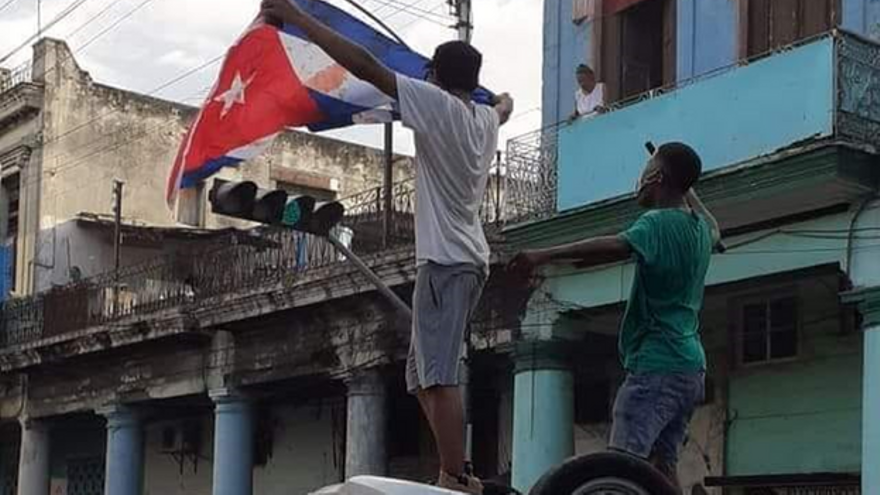
![]() 14ymedio, Pedro Corzo, Miami, July 15, 2023 — We have reached the second anniversary of the peaceful protests led by young Cubans on 11 July 2021, and close to the 67th anniversary of the bloody attack on the Moncada barracks, organized and directed by Fidel Castro on 26 June 1953.
14ymedio, Pedro Corzo, Miami, July 15, 2023 — We have reached the second anniversary of the peaceful protests led by young Cubans on 11 July 2021, and close to the 67th anniversary of the bloody attack on the Moncada barracks, organized and directed by Fidel Castro on 26 June 1953.
The protests of July 11th did not have the objective of seizing power, as was always the ambition of the Castro brothers and their acolytes, although it is fair to recognize that the demands for “freedom” from these young people, who have been imprisoned, imply a deadly demand to all tyranny.
The attack of July 26, 1953 was the starting point for the destruction of the Republic of Cuba. What seemed to be a new revolt in the convulsed history of the nation, was the beginning of a tragedy that has demolished Cubans, and the country, to its deepest roots.
In reality, it was another violent act in our history, perhaps the most poorly planned and worst executed under the command of a particularly ambitious gang member with messianic airs, who never spared any damages in order to achieve his goals. Undoubtedly, the attack on the military stronghold transformed Fidel Castro into a kind of star of the cult of violence on the Island and abroad. He vertiginously stopped being a university gangster with a pistol at his belt, to become the champion of all those who wanted to do justice, for themselves and in their way.
Unfortunately for Cuba and the hemisphere, Fidel Castro, although he failed as a ruler, succeeded in his intentions as a snake charming piper because he managed to get many people to follow him and even impose his political formula of taking power and keeping it until death. For examples, at least four: Hugo Chávez, Evo Morales, Nicolás Maduro and Daniel Ortega.
The seduction that Castro’s proposals exercised over his national and foreign supporters does not differ much from that achieved by his teachers Adolfo Hitler, Benito Mussolini, Leon Trotsky and Vladimir Lenin. Regardless of the ideology that each one of them promoted, they always found eager subjects to implement their delusions, which have always resulted in more violence, destruction and death.
It is true that the attack on the Moncada Barracks and the Granma expedition were a resounding failure. In addition, the guerrilla in the Sierra Maestra, the supposed invasion to Las Villas and the final attack on a falsely armored train, have been oversized feats, we must recognize that the survivors of the assault, particularly the Castro brothers, imposed a regime that is close to sixty-five years old and outlived its main builder.
It is a great truth that Castroism has nothing to be proud of, but unfortunately the history of Cuba cannot be written without making reference to the mandate of Fidel Castro, for many scholars, the most extensive dictatorial exercise in history.
Fidel Castro’s return to politics was the consequence of the lack of identity of purpose of another dictator, Fulgencio Batista, who decided to release the Moncada attackers a few months after their confinement despite having caused the death of 18 of his men and wounding 28 others. Nine of the assailants died and 11 were wounded, although, according to this information, numerous attackers were executed immediately after their capture, sparing Fidel Castro and his brother, Raúl, their lives, apparently, even to kill one indulged in indulgences.
Paradoxically, the protesters of 11 July 2021 without murders to their charge, received much higher sanctions than Fidel, who, being directly responsible for dozens of deaths, was sentenced to 15 years in prison, of which he only served 22 months, without limiting his human rights.
The results of the 2021 protests, the blood shed, was the work of totalitarianism, with several hundred prosecuted and sentenced, with at least 36 of them sentenced to between 5 and 25 years in prison for the crime of sedition, is another strong evidence. Since the dictatorship does not voluntarily give up its prerogatives, it must be wrested from it, as the Bronze Titan, Antonio Maceo, wrote: “Freedom is conquered at the edge of the machete, it is not requested; begging for rights is typical of cowards incapable of exercising them.” Honor to the youth of July 11.
Honor to the youth of July 11th.
____________
COLLABORATE WITH OUR WORK: The 14ymedio team is committed to practicing serious journalism that reflects Cuba’s reality in all its depth. Thank you for joining us on this long journey. We invite you to continue supporting us by becoming a member of 14ymedio now. Together we can continue transforming journalism in Cuba.
